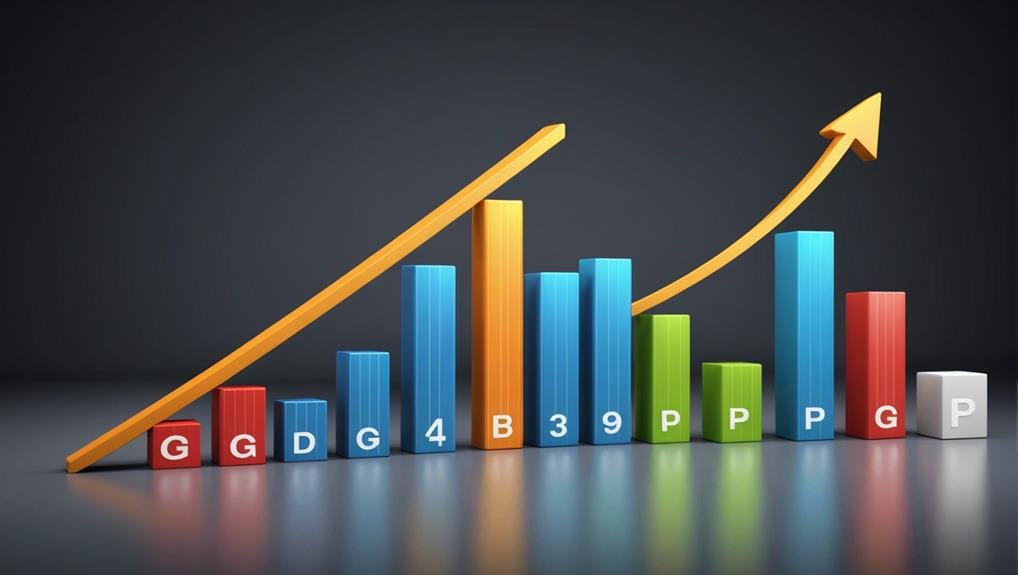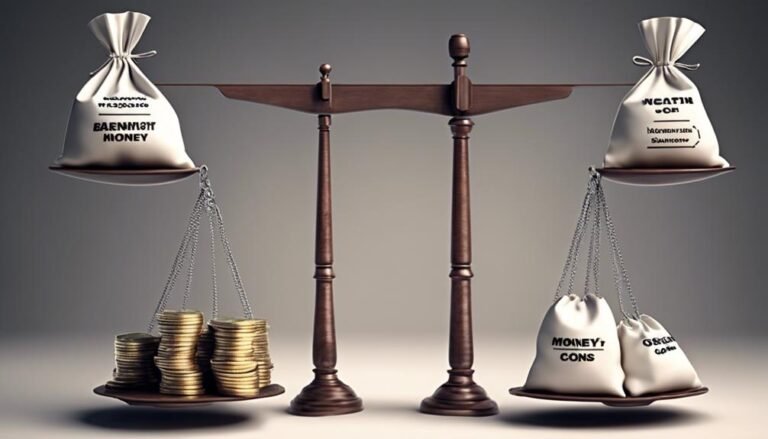What Is Economic Growth and How Is It Measured?
Economic growth signifies a nation's advancement and wealth, gauged by metrics like GDP and GNP, showcasing the significant rise in goods and services production. This growth is pivotal for poverty alleviation, job creation, and societal progress. Various factors including physical and human capital, labor dynamics, and technology play essential roles in shaping growth trends. Understanding these influences is key in sustaining economic progression. As one explores further into economic growth, the phases, impacts, and taxation's role further illuminate the intricate dynamics that drive a nation's financial well-being.
Key Takeaways
- Economic growth is the sustained increase in the production of goods and services.
- Measurement metrics include GDP, GNP, and Real GDP to quantify growth.
- Factors influencing growth include physical and human capital, labor dynamics, and technological advancements.
- Growth phases like expansion and contraction impact employment, income, and production.
- Taxation plays a role in economic growth by impacting demand, investment incentives, and fiscal policy.
Definition and Importance of Economic Growth
Consistently recognized as a fundamental driver of societal progress and prosperity, economic growth entails the sustained increase in the production of economic goods and services over a specified period. Its significance lies in its ability to reduce poverty and enhance societal progress.
Economic growth brings about benefits such as increased job opportunities, higher incomes, improved living standards, and better access to essential services. By expanding the economy, it enables governments to invest in infrastructure, healthcare, education, and social welfare programs, ultimately uplifting the overall quality of life for citizens.
Additionally, sustained economic growth fosters innovation, entrepreneurship, and technological advancements, leading to a more dynamic and competitive economy that can better address societal needs and challenges.
Measurement Metrics for Economic Growth
The assessment of economic growth typically involves utilizing specific measurement metrics to quantify the increase in production of economic goods and services over defined periods. Economic indicators such as Gross Domestic Product (GDP), Gross National Product (GNP), and Real GDP are commonly used for this purpose.
Data analysis plays an important role in evaluating economic growth trends through metrics like quarterly growth rates and year-over-year comparisons. Comparative analysis against international benchmarks provides insights into a country's economic performance relative to global standards.
Factors Influencing Growth Trends
Influential determinants shaping growth trajectories encompass a blend of physical capital, human capital, labor dynamics, and technological advancements. Labor productivity plays a pivotal role in economic growth, where efficient utilization of labor leads to increased output and overall economic performance.
Technological advancements act as a catalyst for growth, driving innovation, efficiency, and competitiveness in various sectors. The synergy between labor productivity and technological advancements often leads to enhanced productivity levels, fostering economic expansion.
Investments in human capital through education, training, and skill development further contribute to growth trends by enhancing the quality and efficiency of the workforce. Understanding and optimizing these factors are essential in sustaining long-term economic growth trajectories and fostering prosperity.
Phases and Impact of Growth
Labor productivity and technological advancements play vital roles in shaping the phases and impact of economic growth, driving innovation, efficiency, and competitiveness across various sectors.
Economic growth moves through phases such as expansion, peak, contraction, and trough within the business cycle. During expansion, there is a rise in employment, income, production, and sales.
Sustainable economic growth is essential for poverty reduction and increased access to public goods, contributing to societal progress. The distribution of growth benefits is crucial for ensuring societal advancement and sustainability.
Understanding the expansion effects and societal progress linked to economic growth is key to formulating policies that support long-term prosperity and well-being.
Taxation's Role in Economic Growth
Taxation plays a pivotal role in shaping the trajectory of economic growth through its impact on demand, investment incentives, and overall fiscal policy. Taxation policies can influence economic growth by affecting disposable income levels, consumer spending patterns, and business investment decisions.
Tax cuts aimed at individuals and businesses can potentially stimulate economic growth by boosting demand and incentivizing entrepreneurial activities. However, the effectiveness of tax cuts in fostering growth depends on various factors, including the current economic conditions and the distribution of benefits across different income groups.
It is essential for policymakers to carefully design taxation measures that align with growth incentives and contribute positively to the overall economic landscape.
Conclusion
To sum up, economic growth stands as the bedrock of a nation's prosperity, reflecting its development trajectory through key metrics like GDP.
The intricate balance of factors such as capital, labor, and technology shapes the growth trajectory, while taxation plays a crucial role in steering economic landscapes.
The impact of economic growth is monumental, driving progress, innovation, and societal well-being on a grand scale.
Essentially, economic growth is not just a metric; it is the cornerstone of a thriving society.







